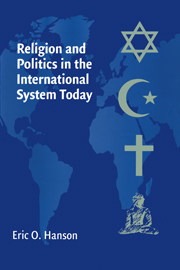Book contents
- Frontmatter
- Contents
- Acknowledgments
- Religion and Politics in the International System Today
- Introdution: The view from Silicon Valley
- I RELIGION AND POLITICS IN THE NEW GLOBAL PARADIGM
- 1 A New Paradigm for World Politics?
- 2 A Political Perspective on Religion and Politics
- 3 A Religious Perspective on Religion and Politics
- 4 The Religions of the Book, Meditative Experience, and Public Life
- II RELIGION IN CONTEMPORARY WORLD POLITICS
- Appendix I Thirty Years of Nobel Peace Prizes, 1975–2004
- Appendix II Paradigm Chart and Category Questions
- Index
4 - The Religions of the Book, Meditative Experience, and Public Life
Published online by Cambridge University Press: 06 January 2010
- Frontmatter
- Contents
- Acknowledgments
- Religion and Politics in the International System Today
- Introdution: The view from Silicon Valley
- I RELIGION AND POLITICS IN THE NEW GLOBAL PARADIGM
- 1 A New Paradigm for World Politics?
- 2 A Political Perspective on Religion and Politics
- 3 A Religious Perspective on Religion and Politics
- 4 The Religions of the Book, Meditative Experience, and Public Life
- II RELIGION IN CONTEMPORARY WORLD POLITICS
- Appendix I Thirty Years of Nobel Peace Prizes, 1975–2004
- Appendix II Paradigm Chart and Category Questions
- Index
Summary
Students of religion and politics must know their history. Much of the religious influence on politics takes place over long time periods. People do not change their basic identities in a split second. Even when they think they do, the resulting identity is formed in reference to the former one. This chapter briefly presents the relevant histories of the seven world religions treated in this book. This historical knowledge will be crucial to understanding contemporary politics in Chapters 5-10. The religions of the book receive more coverage for two reasons: history makes a bigger difference to these religions; and the majority of humanity belongs to them.
RELIGIONS OF THE BOOK: HISTORICAL REVELATION, SCRIPTURE, LAW, AND WORLDVIEW
Shortly after the beginning of the second millennium b.c.e., God called a rich Semitic trader to leave his culturally advanced city on the fertile crescent and to take his family and his belongings to the less developed hinterland. And Abram, later Abraham, went. Roughly six hundred years later the same Yahweh, who then tells the Israelites his name, commanded Moses to lead the descendants of Abraham out of Egypt, where they had fled to escape famine during the time of the patriarch Joseph. Moses led the Israelites through the Red Sea and into forty years of wandering in the desert. Moses's successor, Joshua, led the people into Canaan, the land promised to Abraham and his descendants. The Jews had become a people defined by their covenant with Yahweh.
- Type
- Chapter
- Information
- Religion and Politics in the International System Today , pp. 92 - 120Publisher: Cambridge University PressPrint publication year: 2006



